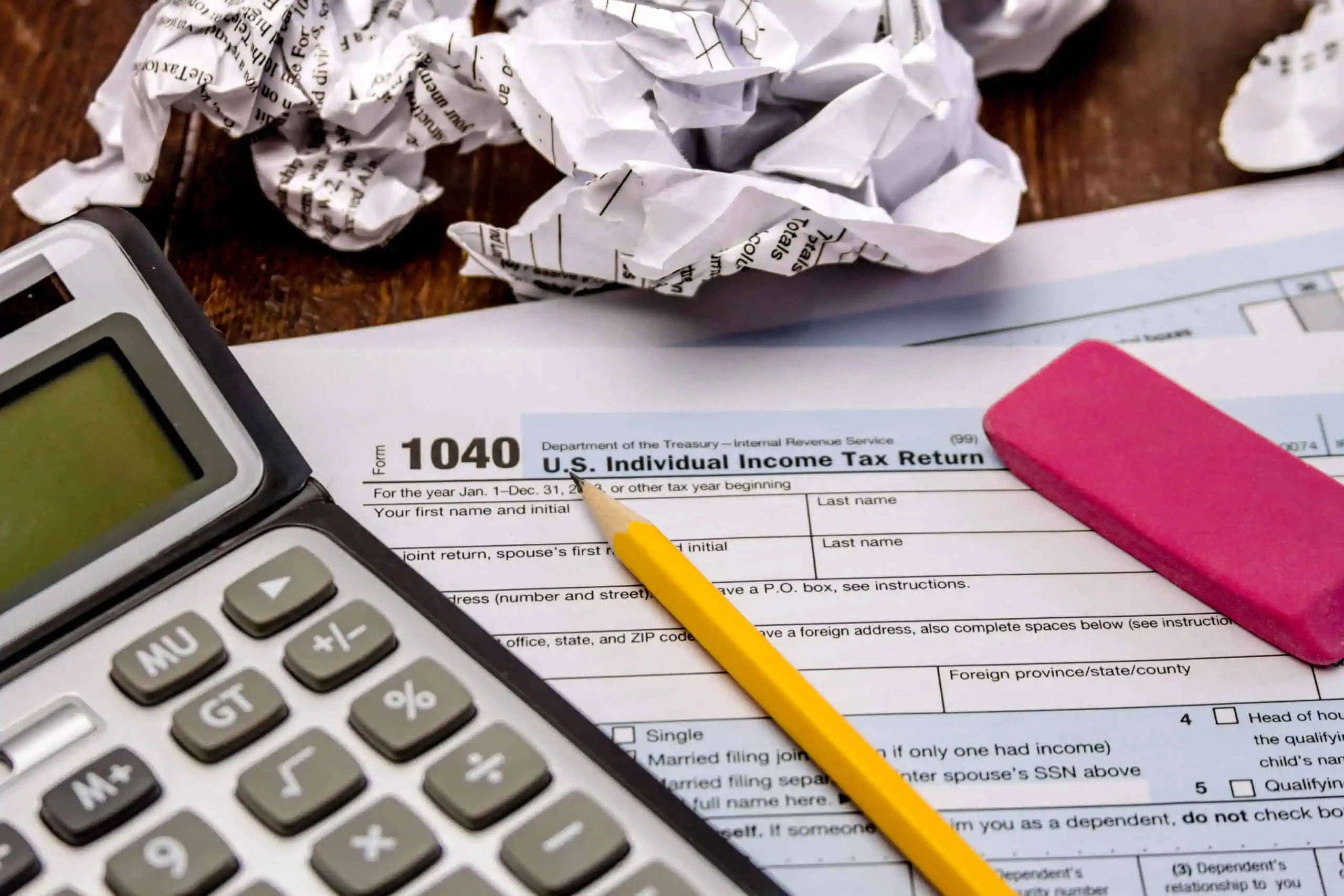Tax Apps: Even The Best Have Drawbacks You Should Be Aware Of
This post may have affiliate links. Please read the Disclosure Policy for complete details.
Paying taxes sucks!
Organizing your tax stuff sure as heck sucks!
And what about actually filing your taxes????
Fuggedaboutit!!!!
Unless you’re using one of the tax apps that magically take care of everything for you (read that with a huge dose of sarcasm).
It could be your business tax return.
Or your individual income tax return.
Some people would actually prefer to go to the dentist, and I really can’t blame them.
And with all of the changes to “simplify” things, it’s actually worse now.
There always seems to be a big discussion when it comes to filing income taxes.
Do you pay a tax preparer to file your taxes?
Do you use tax apps or online tax services to file your tax return?
Do you just say screw it and not even bother?
That last one is a joke–I DO NOT ENDORSE OR CONDONE THAT AT ALL!
But there is always confusion among people about how they should approach it.
And there are always people who will give you their opinions.
As a tax accountant, I wanted to give you my insider view of the subject of tax apps in general.
Why I Don’t Recommend Tax Apps

This isn’t like payday loan services…I’m not totally against tax apps or online tax services entirely.
I do recommend them, but only in certain instances.
And, if I’m being honest, I do have problems with them for people who have more complex or especially fluid situations.
Tax Apps Are After-The-Fact Solutions

What I mean by this is that tax apps can only look backward once the year is over and you have the numbers to process; they’re not able to look forward for guidance during the year.
They are aggregators of existing data, unable to assist in any kind of mid-year or year-end tax planning.
There are no calls during the year to ensure that estimates are being made.
No check-ins to inquire how things are progressing, particularly in the case of those who have business income from a Schedule C or a K-1.
There’s no one to call throughout the year to ask for advice before making an investment or purchase decision.
They can’t sit with you at any time during the year and tell you that you should be adjusting your tax withholding to avoid owing underpayment penalties or prevent you from leaving too much paid in until you file and claim your refund (especially with the rise in tax fraud).
Basically, in a world where so many decisions have tax implications, they provide no value other than preparing tax returns.
No Safeguards Against Incorrect Deductions
Don’t get me wrong, I certainly don’t expect the average person to know all (or even a fraction) of the rules involving tax deductions.
That’s kind of the point of using tax apps to file your taxes.
Unfortunately, there are a few ways in which you can (honestly or not) claim deductions you should absolutely not be claiming and have a way of knowing.
I’ll give you a few examples:
Self-Employed Health Insurance Deduction
I’m not going to go into terrible detail, because I already wrote a pretty in-depth article covering the Self-Employed Health Insurance Deduction.
Two of the rules which must be followed are:
1. You or your spouse cannot be eligible for group coverage–whether or not you take it–to claim this deduction, and
2. The insurance has to be in the name of the business or the owner.
Many people have already left comments on my article asking about various situations and most of them end the same–with me saying that they don’t qualify to take the deduction.
Unfortunately, you can enter your insurance premiums and none of the tax apps will have the capability to tell you that it’s not permitted because you don’t qualify.
Charitable Giving
Another topic I’ve written pretty extensively about–what qualifies as deductible charitable contributions.
Did you know that if you receive value in exchange (ie: dinner) then you deduct the fair value of what you received when calculating your donation?
Did you know that games of chance (lottery, raffle) are not deductible donations?
Were you aware that if you give money to a friend who is collecting donations, then you aren’t the one who gets to claim that charitable deduction?
Do you even care?
There are some people out there who won’t and, once again, no tax apps on the market will prevent people from entering those figures into their tax returns.
This confusion also applies to non-cash contributions, particularly with valuations.
Do you value your donations at the same price you paid?
Do you value your donation at the price it is currently in the closest retail outlet?
You could put any amount you wanted regarding what you donate to charity and there would be no one to let you know that you’re doing it wrong.
Medical Expenses & Health Insurance
Just like the previous two examples, there are rules that must be followed.
For something like medical expenses, certain items are specifically excluded such as dietary supplements, gym memberships, and elective surgery among others.
They absolutely do not belong included with legitimate medical deductions on your tax return.
With health insurance, there are a lot of folks who already have their premiums taken out pre-tax through payroll check deductions or via an HSA account.
Those people are not allowed to deduct the premiums on the tax return because that is double-dipping–taking a deduction for something that was already exempt from income tax, to begin with.
And, just like the previous examples, there is nothing any tax app can do to prevent people from breaking the rules.
There are so many more areas of abuse that this applies to such as
- Business expenses
- HELOC interest
- Mileage/auto use
- Child care costs
- Education expenses
- and more
Look, I am in no way perfect at anything, no professional is.
The point is that an experienced human tax preparer with ethics would not use those items in the preparation of a tax return, whereas someone doing their own has no clue and the apps have no way to prevent these mistakes.
All Tax Experts Aren’t Created Equal
Now a lot of tax apps are offering live experts to review your returns.
Anyone who has ever heard or read my thoughts on the subject knows how I feel–and I’ll repeat it here for those who are new:
You need to work with someone who understands and has experience in your particular situation.
Not all CPAs are well-versed in every aspect of taxes–hell, some don’t know shit as their fields of expertise lie in auditing, valuation, etc.
Not all tax professionals are familiar with online solopreneurship, the nuances of post-secondary education, or rental properties.
Just because these tax apps are giving you access to an “expert” doesn’t mean they are providing you value there.
The best way to find a tax accountant is to interview them to see if they “get” you and your specific situation.
And there is no guarantee that the “expert” assigned to you by the sheer luck of the draw is not really helpful.
Tax Apps Use “Unethical” MARKETING TACTICS
This is a short one.
Some would dare to call this nit-picking, but I would strongly disagree.
I call it a cheap marketing trick.
Show me any piece of marketing for any of the tax apps–print, online, radio, tv–and they all focus on one thing:
TAX REFUNDS
They all emphasize the largest refunds.
That is just plain wrong.
The focus should be on one thing and one thing only:
ENSURING THE MOST ACCURATE TAX RETURN AND EASIEST PROCESS!
Why?
Not everyone gets a refund.
If everyone doesn’t get a refund, then what is the value proposition?
If everyone doesn’t get a refund, then what separates one from the others?
The focus is on the wrong thing.
Then again, the marketing agencies only care about making memorable campaigns, not responsible ones I guess.
Why I Do Recommend Tax Apps
Hey, it’s not all bad when it comes to online tax preparation tools.
While it may seem like I did a lot of bashing, there are some positive aspects that I like a heck of a lot.
One thing I love about electronic filing is the fact that it’s an identity theft protection measure.
It’s a lot harder for people to steal your identity off of tax records when the filing and payment/refund are all done electronically vs. on paper sitting in your mailbox!
So without further adieu let’s look at some other reasons why I recommend using these products:
Simple Is OK to DIY

I’d have to say the most common question about tax preparation is:
Should I pay someone to prepare and file my taxes or use online tax apps?
Almost everyone who starts a conversation with me about the subject
My honest answer is always the standard answer for so many financial-based inquiries: it depends.
And to be completely honest I always advise extreme caution when considering do-it-yourself projects in general but specifically DIY taxes.
It depends on how comfortable you are in preparing your own taxes.
It depends on how complex your situation is.
And it depends on your ability to pay for someone to do it for you.
All in all, if you are the type that has a relatively simple return–just W-2(s), interest, dividends, maybe some capital gains, and student loan interest you should have no reason not to try it yourself.
There generally isn’t much that would trip you up, and the few questionable parts can be solved with the program-based support options.
The best part is that if you are a little skittish about your results you can always get a pro to review your return before hitting “file now” (or whatever the button says to finalize the return).
And the reason I say it’s something you should be able to get done on your own is that…
The Interfaces On Many Tax Apps Make filing Easy
One of the best things about most of the top tax preparation apps is the interface.
Rather than sitting with the forms and instructions side by side on your desk, you get a simple-to-use, aesthetically pleasing input method.
Many take you through a questionnaire to both make sure you are putting everything that’s required, but also not miss anything that could cause you any problems.
It’s like a logical progression that follows the lines and forms of the tax forms almost perfectly.
You are asked simple, easy-to-understand questions to determine whether or not a particular area/line item applies to you.
No more going line-by-line trying to decipher the instructions to try to figure out what you should be putting and where.
Organization is a key element in making sure that a tax return is filed accurately and completely.
And the way everything is presented is in plain English, as opposed to industry jargon since we all know how frustrating it can be when we’ve talked to in terms we simply can’t follow or understand.
It also helps that you are only presented with a small section at a time so it doesn’t feel so overwhelming.
The Price (Of A Tax App Is Often) Right

Cost is one of the biggest issues for a lot of people.
I’ll be totally honest, for those who come to me asking to pay me to file a return with just a W-2 and some interest or dividends, I send them to TurboTax.
There is simply no way I can look myself in the mirror if I take someone’s hard-earned money for doing something they should be doing themselves.
And if you qualify for the free filing option it’s even better.
The purpose of the whole “tax reform” was to make it simpler for the majority of people to file their returns by simplifying it.
That gives this same majority even more reason to not spend hundreds of dollars on a professional–I’ve actually seen H&R Block charge $280 for just a W-2 return a few years ago.
The positive is that even if you don’t qualify for free filing, you will at least only have to pay a nominal fee vs. a professional tax preparer’s invoice.
There are always going to be people who have their opinions on how you should prepare your taxes.
The “DIY” group will almost always say that you should do everything yourself.
The “go pro” group will almost always say that you should outsource everything you aren’t an expert in. (I lean more in this direction for the most part).
The important thing is this:
DO WHAT IS RIGHT/BEST FOR YOU NOT WHAT ANYONE ELSE SAYS TO DO!
This is just to provide you with a different look at tax apps in general but from a professional tax preparer’s point of view.
What Are The Best Tax Apps?
This, obviously, was a look at tax apps and online tax services in general.
I’m not in the business of testing every single program out there as I would lose my mind if I tried.
If you’re looking for something that focuses more on specific tax apps and which are the best for specific purposes, go visit this comparison of The Best Tax Software at The College Investor.
And for my Canadian people, I have you covered as well. You can check out The Best Canadian Tax Software Options from Maple Money.
I’m friends with the people who own both sites and trust their judgment…or else I wouldn’t send valuable traffic their way. 🤣
You can find all the information you need to make an informed decision as to what might be the best tax app for you.
Wrapping Up
There you have it…why, in my professional opinion, you should or shouldn’t use tax apps when filing your income tax returns.
Should you tax my advice blindly just because I’m a tax pro?
Absolutely not!
You should do your due diligence in researching the different tax apps that are on the market.
Then you should do some self-reflection to see if it’s something you even want to try on your own.
I always tell potential clients to try using a tax app (if you do it without paying upfront) to see if you are comfortable, and if you aren’t you can always contact a tax preparer to do it.
The bottom line is that tax apps can be beneficial to you but they can also be harmful and you need to know all of this to make an informed decision!
Your Turn
How do you file your income taxes? Do you use tax apps or do you pay a tax preparer? Have you ever messed up and ended up having to pay a pro to fix it anyway? Have you done both and found one to be a better option than the other? (remember, what works for one doesn’t always work for everyone and vice versa)

